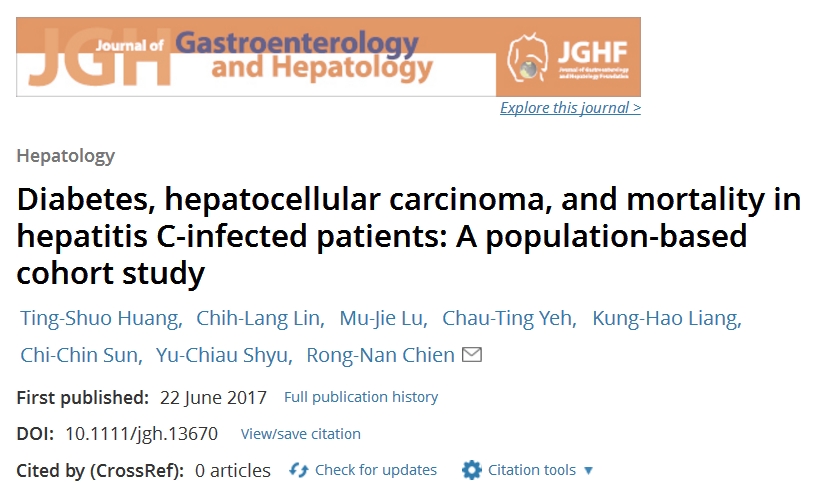Search Product
Structure Search
Search
Advantage Products
Location: Industrial Info
Effect of diabetes mellitus on carcinogenesis of HCV infection
2017-07-12
来源:转载自第三方
12 July 2017
Researchers from Taiwan Chang Gung Memorial Hospital have recently analyzed the effects of diabetes on liver cancer, according to the National Health Insurance Research Data of Taiwan. The study has been published in "Journal of Gastrienterology and Hepatology", entitled "Diabetes, hepatocellular carcinoma, and mortality in hepatitis C-infected patients: A population-based cohort study".

Diabetes is a complex chronic disease with increasing trend, and there are more and more patients. Chronic hepatitis C (HCV) belongs to the Flaviviridae, which can be divided into six genotypes and different subtypes. Many studies have confirmed that the role of insulin in patients with hepatitis C decreased, causing diabetes. Why is this happening? Doctors found that a substance in the blood of hepatitis C patients called "tumor necrosis factor" increased, which can interfere with insulin, leading to "insulin resistance"; In addition, hepatitis C virus often causes fatty degeneration of hepatocytes, fatty liver and liver iron metabolism abnormalities, and "insulin resistance" is closely related to the occurrence of liver iron metabolism can not only affect the liver glucose metabolism, the excess iron deposition in the islet cells can also cause the occurrence of diabetes.
What is the effect of diabetes on HCV infection?
Researchers retrieve and recruited new diagnosis of diabetes with HCV infection from the database, according to age, gender, alcohol liver and baseline cirrhosis degree to identify the corresponding patients, and use multi-state model to study the transition process of "start to HCC", “start to Death" and "HCC to death". The results showed that the risk of transition to the above three groups was higher in the diabetic population. Multivariable transition-specific Cox models demonstrated that DM significantly increased the risk for transition from “start-to-HCC”, “start-to-death”, and “HCC-to-death”. The effect of liver cirrhosis on “start-to-HCC” and “start-to-death” transitions decreased over time, particularly within 2 years. 10 years follow-up found that diabetes mellitus increased cumulative mortality in HCV-infected patients.
There is a complex relationship between chronic HCV infection and diabetes. On the one hand, HCV-infected patients are more likely to develop diabetes or insulin resistance than those of common populations or other viruses; on the other hand, diabetes increases the incidence of hepatocellular carcinoma and all-cause mortality in patients with HCV infection. But the mechanism still needs further study.
Related links: ACP: Metformin Still Best As First Type II Diabetes Treatment
Gospel of Chinese patients with hepatitis C, all oral drugs are approved by CFDA
Gospel of Chinese patients with hepatitis C, all oral drugs are approved by CFDA
Edited by Suzhou Yacoo Science Co., Ltd.
如果涉及转载授权,请联系我们。












